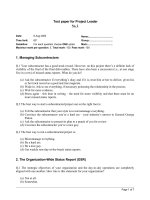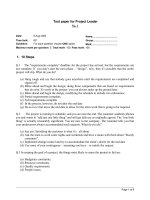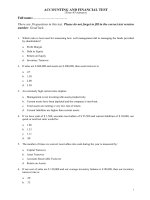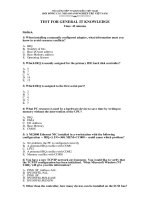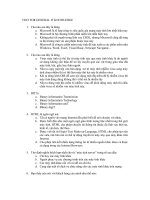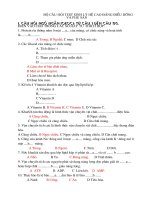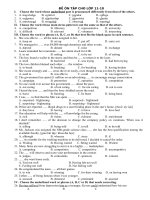- Trang chủ >>
- Đề thi >>
- Đề thi lớp 6
TEXTBASED TEST 1235
Bạn đang xem bản rút gọn của tài liệu. Xem và tải ngay bản đầy đủ của tài liệu tại đây (45.33 KB, 3 trang )
TOPIC 13 - WOMEN IN SOCIETY
Circle the word whose underlined part is pronounced differently from that of the others.
Question 1. A. women
B. movie
C. lose
D. prove
Question 2. A. intellectual B. international
C. interview
D. responsibility
Question 3. A. rear
B. bear
C. fear
D. dear
Circle the word marked A, B, C, or D which has a different stress pattern from the others.
Question 4. A. achievement B. involvement
C. confinement
D. argument
Question 5. A. pioneer
B. mountaineer
C. suggestion
D. engineer
Choose the option marked A, B, C, or D that best fits each blank.
Question 6. People used to consider women to be better______ for childbearing and homemaking.
A. regarded
B. suited
C. understood
D. kept
Question 7. In the past, men seemed to___________ their duties at home.
A. expect
B. inspect
C. neglect
D. collect
Question 8. Nowadays, women have gained significant legal___________ .
A. wrongs
B. rights
C. responsibilities D. works
Question 9. The pioneer thinkers___________ that women shouldn’t be discriminated on the basis of
their sex.
A. recommended
B. disapproved
C. showed
D. passed
th
Question 10. The___________ for women’s rights began in the 18 century.
A. battle
B. war
C. struggle
D. fight
Question 11. Women are only asking to be given equal___________ to that of men.
A. state
B. status
C. situation
D. ideas
Question 12. That scholar___________ on people who haven’t been to university.
A. looks up
B. looks at
C. looks down
D. looks on
Question 13. Most relations between men and women soon___________ in to love.
A. deep
B. deepen
C. deeply
D. depth
Question 14. The newspaper provided little___________ about the cause of the war.
A. enlightenment
B. meanings
C. reasons
D. ideas
Question 15. It’s___________ to say that women are slaves at home.
A. truth
B. action
C. legality
D. rubbish
Question 16. He didn’t even have the intelligence to call___________ an ambulance.
A. at
B. on
C. for
D. about
Question 17. From 1865 to 1875, a remarkable variety of inventions___________.
A. was produced
B. were produced
C. are produced
D. produced
Question 18. The French Quarter is___________ famous and the oldest section of New Orleans.
A. more
B. the most
C. the more
D. most
Question 19. The painting___________ Ms. Wallace bought was very expensive.
A. whom
B. whose
C. which
D. where
Question 20. You___________ carry that carpet home yourself; the shop will send it.
A. can’t
B. couldn’t
C. needn’t
D. mustn’t
Question 21. Will it be necessary for us___________ this accident to the police?
A. report
B. to reporting
C. to report
D. reporting
Question 22. A beautiful clock was given_________ her by a handsome boy.
A. for
B. to
C. at
D. ф
Question 23. The kitchen hadn’t been cleaned for ages. It was really_________.
A. disgusted
B. disgust
C. disgusting
D. to disgust
Question 24. She’s very old and can’t live alone. She needs someone to look___________ her.
A. for
B. at
C. up
D. after
Question 25. It was the___________ day of my life when I heard I failed the university entrance
examination. A. sadden
B. saddest
C. sad
D. sadly
Question 26. The homeless people___________ story appeared in the paper last week have now
found a place to live.
A. who
B. whom
C. that
D. whose
Question 27. It is our duty to care for___________ sick.
A. an
B. the
C. a
D. ф
Question 28. Rachel will be pleased if she___________ her driving test.
A. would pass
B. had passed
C. passes
D. passed
Question 29. The___________ you are, the more quickly you learn.
A. more young
B. youngest
C. younger
D. young
Question 30. Martha Graham, _________ of the pioneers of modern dance, didn’t begin dancing until
she was 21.
A. one
B. who, as one
C. she was
D. was one
Identify the word/ phrase that must be changed to make the sentence correct.
Question 31. Actually, I strongly disapprove of your bad behave towards your parents. {behaviour}
A. behave
B. Actually
C. of
D. parents
Question 32. Modern motorcycles are lighter, faster, and specialized than motorcycles of 25 years
ago. {and more specialized}
A. motorcycles
B. and specialized C. lighter
D. Modern
Question 33. Job enrichment is a technique used to increase satisfaction workers by giving them
more responsibilities. {satisfactory}
A. responsibilities B. giving them
C. satisfaction workers
D. technique used
Question 34. In spite of their frightening appearance, the squid is shy and completely harmless.
{its}
A. In spite of
B. frightening
C. harmless
D. their
Question 35. Virgin Islands National park features a underwater preserve with coral reefs and
colorful tropical fish. {an}
A. a underwater
B. fish
C. colorful
D. coral
Choose the suitable option marked A, B, C, or D to fill in each blank.
The future role of women can be looked at more optimistically. Nowadays, there seems
(36)_________
recognition of the vital role women play in society and more status is given to
women. Overall, excellent progress has been made (37)_________ education. This has played a
powerful role for women self-esteem. It demonstrates women’s intellectual abilities to gain
expertise in the field of their choice. However, this progress has still to be reflected in the job
market. Since a more educated society is good for industry and society (38)_________ a whole, it is
even more urgent for women to gain an acceptable status in their profession. The message is that
women have the ability to change their roles and that they will demand to have the means to do it.
It is (39)_________ accepted by the new generation of young men and women that co-operation and
mutual aid are far more productive than the divider camp of men and women. Society is changing
and with it the role of men and women. In many fields women have come a long way from just
their roles as mothers and homemakers. They no longer think that children rearing and home
management are their (40)_________ duties. {rear/riә/: bring up and educate}
Question 36. A. be
Question 37. A. in
Question 38. A. to
Question 39. A. general
Question 40. A. sole {single}
B. being
B. at
B. as
B. generally
B. lonely
C. to being
C. on
C. out
C. generality
C. alone
D. to be
D. for
D. for
D. generalize
D. own
Read the passage and choose the best answers among A, B, C, or D provided.
Until the 19th century, the denial of equal rights to women met with only occasional protest
and drew little attention from most people. Because most women lacked the educational and
economic resources that would enable them to challenge the prevailing social order, women
generally accepted their inferior status as their only option. At this time, women shared these
disadvantages with the majority of working class men, as many social, economic, and political
rights were restricted to the wealthy elite [phần tử ưu tú]. In the 19th century, as governments in
Europe and North America began to draft new laws guaranteeing equality among men, significant
numbers of women – and some men – began to demand that women be accorded equal rights as
well.
At the same time, the Industrial Revolution in Europe and North America further divided
the roles of men and women. Before the Industrial Revolution most people worked in farming or
crafts-making, both of which took place in or near the home. Men and women usually divided the
numerous tasks among themselves and their children. Industrialization led male workers to seek
employment outside of the home in factories and other large-scale [extensive] enterprises. The
growing split between home and work reinforced the idea that women’s “rightful place” was in the
home, while men belonged in the public world of employment and politics.
Organized efforts by women to achieve greater rights occurred in two major waves. The
first wave began around the mid-19th century, when women in the United States and elsewhere
campaigned to gain suffrage [right to vote in political elections]– that is, the right to vote. This wave
lasted until the 1920s, when several countries granted women suffrage.
Question 41. Why did the denial of equal rights to women draw little attention from the society
until the 19th century?
A. They could not challenge the prevailing social order.
B. They did not have any other option.
C. Most women lacked the educational and economic resources.
D. All are correct.
Question 42. Until the 19th century, what was the status of the working class men in the society?
A. They had the same rights as women.
B. They had no right at all.
C. They did not have much power compared to the wealthy people.
D. They had much power in the society.
Question 43. When did the women’s movement start in Western countries?
A. in the 18th century
B. in the late 18th century
th
C. in the 19 century
D. in the early 20th century
Question 44. What did the effect of the Industrial Revolution in Europe and North America bring
about? A. Male workers tried to seek employment outside of the home.
B. It did not bring the equality to women.
C. Well-educated, upper-class men controlled most positions of employment and power in
society.
D. All are correct.
Question 45. What was the aim of the women’s movement in the United States in the 1920s?
A. to gain the right to have much power in the society
B. to gain the right to vote
C. to gain the right to go to work in the factory
D. to have the complete equality to men
Mark the letter A, B, C, or D to indicate the word or phrase that is CLOSEST in meaning.
Question 46. Scientists warn of the impending extinction of many species of plants and animals.
A. irrefutable
B. imminent
C. formidable
D. absolute
Question 47. The aircraft carrier is indispensable in naval operations against sea or shore based
enemies. A. unique
B. novel
C. vital
D. exotic
Question 48. The use of lasers in surgery has become relatively commonplace in recent years.
A. absolutely
B. relevantly
C. comparatively
D. almost
Mark the letter A, B, C, or D to indicate the word or phrase that is OPPOSITE in meaning.
Question 49. I'll have to whisper to you, otherwise he will hear.
A. say
B. whistle
C. shout
D. talk
Question 50. Only the interior of the building is going to be remodeled.
A. exterior
B. outward
C. external
D. coastal
---------------------THE END----------------------

